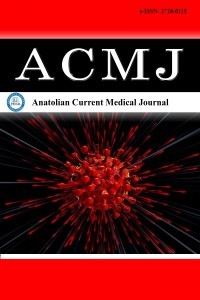Favorable effects of close telephone follow-up on Helicobacter pylori eradication success
Favorable effects of close telephone follow-up on Helicobacter pylori eradication success
Helicobacter pylori, Telephone Follow-up, Eradication,
___
- Kaplan M, Tanoglu A, Duzenli T, Tozun AN. Helicobacter pylori treatment in Turkey: Current status and rational treatment options. North Clin Istanb 2019; 7: 87-94.
- Ruiter R, Wunderink HF, Veenendaal RA, Visser LG, de Boer MGJ. Helicobacter pylori resistance in the Netherlands: a growing problem? Neth J Med 2017; 75: 394-8.
- Dooley CP, Cohen H, Fitzgibbons PL, et al. Prevalence of Helicobacter pylori infection and histologic gastritis in asymptomatic persons. N Engl J Med 1989; 321: 1562-6.
- Sezikli M, Sirin G, Akkan Cetinkaya Z, et al. Comparison of the efficacy of six different Helicobacter pylori eradication regimens: greater than or equal to another. Biomedical Research 2018; 29: 1143-8.
- Malfertheiner P, Megraud F, O’Morain CA, et al. Management of Helicobacter pylori infection–the Maastricht IV/Florence Consensus Report. Gut 2012; 61: 646–64.
- Graham DY, Fischbach L. Helicobacter pylori treatment in the era of increasing antibiotic resistance. Gut 2010; 59: 1143-53.
- Safavi M, Sabourian R, Foroumadi A. Treatment of Helicobacter pylori infection: current and future insights. World J Clin Cases 2016; 4: 5-19.
- Kekilli M, Onal IK, Ocal S, et al. Inefficacy of triple therapy and comparison of two different bismuth-containing quadruple regimens as a firstline treatment option for Helicobacter pylori. Saudi J Gastroenterol 2016; 22: 366-9.
- Pérez-Arellano E, Rodriguez-Garcia MI, Galera Rodenas AB, de la Morena-Madrigal E. Eradication of Helicobacter pylori infection with a new bismuth-based quadruple therapy in clinical practice. Gastroenterol Hepatol 2018; 41: 145-52.
- Wermeille J, Cunningham M, Dederding JP, et al. Failure of Helicobacter pylori eradication: is poor compliance the main cause? Gastroenterol Clin Biol 2002; 26: 216-9.
- Gisbert JP, Calvet X. Review article: the effectiveness of standard triple therapy for Helicobacter pylori has not changed over the last decade, but it is not good enough. Aliment Pharmacol Ther 2011; 34: 1255-68.
- Ching CK, Chan YK, Ng WC. The combination of omeprazole, amoxycillin, and clarithromycin eradicates Helicobacter pylori in 95% of patients-7 days of therapy is as good as 10 days. Hong Kong Med J 1998; 4: 7-10.
- IARC Working Group on the evaluation of carcinogenic risks to humans schistosomes, liver flukes and Helicobacter pylori . Lyon, 7–14 June 1994. IARC Monogr Eval Carcinog Risks Hum 1994; 61: 1-241.
- Correa P, Fontham ET, Bravo JC, et al. Chemoprevention of gastric dysplasia: randomized trial of antioxidant supplements and anti-Helicobacter pylori therapy. J Natl Cancer Inst 2000; 92: 1881-8.
- Wong WM, Gu Q, Wang WH, et al. Effects of primary metronidazole and clarithromycin resistance to Helicobacter pylori on omeprazole, metronidazole, and clarithromycin triple-therapy regimen in a region with high rates of metronidazole resistance. Clin Infect Dis 2003; 37: 882-9.
- Aydın A, Günşar F, Yılmaz M, et al. Ranitidine bismuth citrate based dual and triple therapies in Helicobacter pylori eradication. Turk J Gastroenterol 1999; 10: 202-6.
- Graham DY, Fischbach L. Helicobacter pylori treatment in the era of increasing antibiotic resistance. Gut 2010; 59: 1143–53.
- De Francesco V, Ierardi E, Hassan C, Zullo A. Helicobacter pylori therapy: Present and future. World J Gastrointest Pharmacol Ther 2012; 3: 68-73.
- Ching SS, Sabanathan S, Jenkinson LR. Treatment of Helicobacter pylori in surgical practice: A randomised trial of triple versus quadruple therapy in a rural district general hospital. World J Gastroenterol 2008; 14: 3855-60.
- Xie Y, Pan X, Li Y, et al. New single capsule of bismuth, metronidazole and tetracycline given with omeprazole versus quadruple therapy consisting of bismuth, omeprazole, amoxicillin and clarithromycin for eradication of Helicobacter pylori in duodenal ulcer patients: a Chinese prospective, randomized, multicentre trial. J Antimicrob Chemother 2018 ; 73: 1681-7.
- Gong Y, Li Y, Sun Q. Probiotics improve efficacy and tolerability of triple therapy to eradicate Helicobacter pylori: a meta-analysis of randomized controlled trials. Int J Clin Exp Med 2015; 8: 6530–43.
- Cremonini F, Di Caro S, Covino M, et al. Effect of different probiotic preparations on anti-Helicobacter pylori therapy-related side effects: a parallel group, triple blind, placebo-controlled study. Am J Gastroenterol 2002; 97: 2744-9.
- Wang CH, Liao ST, Yang J, et al. Effects of daily telephone-based re-education before taking medicine on Helicobacter pylori eradication: A prospective single-center study from China. World J Gastroenterol 2015; 21: 11179-84.
- Peng X, Song L, Chen W, Zheng Y. Effect of telephone follow-up on compliance and Helicobacter pylori eradication in patients with Helicobacter pylori infection. Zhong Nan Da Xue Xue Bao Yi Xue Ban 2017; 42: 308-312.
- Gisbert JP, de la Morena F, Abraira V. Accuracy of monoclonal stool antigen test for the diagnosis of H. pylori infection: a systematic review and meta-analysis. Am J Gastroenterol 2006; 101: 1921–30.
- Yayın Aralığı: Yılda 4 Sayı
- Başlangıç: 2019
- Yayıncı: MediHealth Academy Yayıncılık
Is procalcitonin a good marker for Acinetobacter infections?
A rare Meckel’s diverticulum complication in inguinal hernia: case report of Littre hernia
Invasive home mechanical ventilation (I-HMV) experience at a palliative care center
Abdullah KAHRAMAN, Mustafa Özgür CIRIK
Tuğba GÜRBÜZ, Nur DOKUZEYLÜL GÜNGÖR, Arzu YURCİ
Fatih ATEŞ, Abidin KILINÇER, Hakan CEBECİ, Mehmet Sedat DURMAZ
An atypical presentation of cutaneous leishmaniasis
Ahu YORULMAZ, Başak YALÇIN, Ayşe Nur YILMAZ
İnşa Gül EKİZ İŞCANLI, Bengü ŞAYLAN
Evaluation of oxidative stress in pregnants with chronic hepatitis B and C
Mustafa AKAR, Gülden BAŞKOL, Mehmet YÜCESOY
Treatment outcomes of pulmonary multidrug-resistant tuberculosis; 10 year follow up study
Hüseyin ARPAĞ, Murat YALÇINSOY, Sinem GÜNGÖR, Tülin KUYUCU, Nurhan ATİLLA
Favorable effects of close telephone follow-up on Helicobacter pylori eradication success
Başak ÇAKIR GÜNEY, Tolga DÜZENLİ, Yeşim ÖNAL, Mustafa KAPLAN, Alpaslan TANOĞLU
